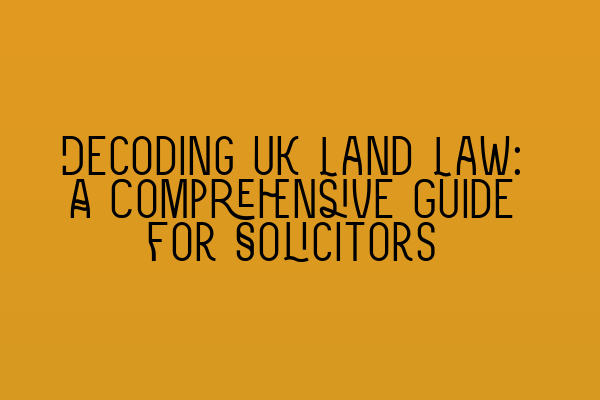Decoding UK Land Law: A Comprehensive Guide for Solicitors
Welcome to SQE Property Law & Land Law, your trusted source for legal guidance in the complex world of UK land law. In this comprehensive guide, we will decipher the intricacies of land law to help you navigate through its complexities with ease. Whether you are a newly qualified solicitor or an experienced practitioner looking to refresh your knowledge, this guide will serve as a valuable resource in your quest for legal excellence.
Understanding the Basics
Before diving into the depths of UK land law, it is vital to grasp the fundamental concepts that underpin this area of the law. Land law primarily deals with the rights and obligations associated with real property, including land and buildings. These rights and obligations are governed by a range of statutes, common law principles, and equitable doctrines that have developed over centuries.
It is essential to note that land law in the UK differs across England, Wales, Scotland, and Northern Ireland, as each jurisdiction has its own legal system and legislation. This guide will focus primarily on land law in England and Wales, but many of the principles discussed here have similarities in other parts of the UK.
The Legal Framework
In England and Wales, land law is primarily governed by two key pieces of legislation: the Law of Property Act 1925 and the Land Registration Act 2002. These acts provide the foundation for the legal framework within which land transactions occur and property rights are established.
The Law of Property Act 1925 consolidates and simplifies the law relating to property, including the creation and transfer of interests in land, the creation and enforcement of mortgages, and the rules governing co-ownership. Understanding the intricacies of this act is crucial for any solicitor dealing with land law matters.
The Land Registration Act 2002 revolutionized the process of registering land, introducing a system of electronic registration and streamlining the conveyancing process. This act establishes the legal basis for land registration in England and Wales, creating a centralized register to guarantee and protect land ownership rights.
Key Concepts and Principles
Now that we have covered the basics and the legal framework, let’s explore some key concepts and principles that form the backbone of UK land law:
1. Freehold and Leasehold
A property can be held either as freehold or leasehold. Freehold ownership grants the owner complete and indefinite rights over the land, while leasehold ownership provides a temporary interest in the land for a fixed period, typically through a lease agreement.
Unraveling the Complexities of UK Bail Laws
Remand in Custody: Understanding Detention Prior to Trial
Appeals in Criminal Law: A Roadmap to Seeking Justice
Exclusion of Evidence: Understanding Grounds and Implications
Understanding Sentencing Guidelines in UK Criminal Cases
2. Estates and Interests
Estates and interests describe the rights and privileges that individuals or entities have in relation to a property. This includes legal and equitable interests, as well as leasehold and freehold estates.
3. Easements
Easements are rights attached to land that allow an individual to use another person’s land for a specific purpose, such as a right of way or a right to access utilities.
4. Covenants
Covenants are legal obligations or promises that run with the land. They can be positive (requiring the landowner to do something) or restrictive (preventing the landowner from doing something).
Land Transactions
Solicitors dealing with land law must be familiar with the intricacies of land transactions, including the process of buying, selling, and mortgaging property. Some key aspects include:
1. Conveyancing
Conveyancing refers to the legal process of transferring ownership of real property from one party to another. This process involves various steps, including property searches, drafting contracts, conducting negotiations, and registering the transfer with the Land Registry.
2. Mortgages
A mortgage is a loan secured against a property. Solicitors play a vital role in advising both lenders and borrowers on the legal aspects of mortgages, including drafting mortgage deeds, conducting title checks, and registering the mortgage.
Resolving Disputes
Inevitably, disputes can arise in the realm of land law. As a solicitor, you must be equipped to handle these disputes effectively. Some common areas of dispute include:
1. Boundary Disputes
Boundary disputes occur when there is uncertainty or disagreement over the exact boundaries of a property. Solicitors can assist in resolving these disputes through negotiation, mediation, or, if needed, through litigation.
2. Adverse Possession
Adverse possession occurs when an individual gains ownership of another person’s land through their continuous and exclusive possession for a specified time period. Solicitors can provide advice on the legal implications of adverse possession and assist in resolving related disputes.
Conclusion
Decoding UK land law can be a daunting task, but with the right knowledge and expertise, solicitors can navigate through its complexities with confidence. By understanding the legal framework, key concepts, land transactions, and dispute resolution mechanisms, solicitors can provide invaluable guidance to their clients in matters of property law.
If you’re interested in delving deeper into different aspects of criminal law, we recommend the following related articles:
Unraveling the Complexities of UK Bail Laws
Remand in Custody: Understanding Detention Prior to Trial
Appeals in Criminal Law: A Roadmap to Seeking Justice
Exclusion of Evidence: Understanding Grounds and Implications
Understanding Sentencing Guidelines in UK Criminal Cases
At SQE Property Law & Land Law, we are committed to providing the highest level of legal expertise and support to solicitors operating in this complex field. Contact us today to discover how we can assist you in your journey towards legal excellence in land law.
